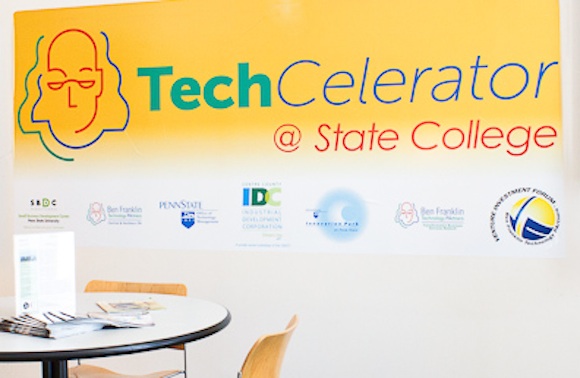On Tuesday, Keystone Edge hit the road, traveling to State College to meet with entrepreneurs and attend presentation day at Ben Franklin Technology Partners' TechCelerator@State College. You'll hear more about our conversations with those inspiring founders in the coming weeks, but for now, we thought we'd offer a peek at the six companies who recently graduated from the 10-week program.
Since its inception two years ago, TechCelerator@State College's Startup Boot Camp has graduated four classes comprised of 25 teams. Those teams have resulted in 22 companies that have raised $2.3 million in startup funding and generated $1.3 million in revenue. The program has also produced five incubator tenants at the facility and helped create 60 full- and part-time jobs.
Each team had 15 minutes to present and field questions from the panel; the startups were competing for $10,000 in prize money.
First up was Sel Edor from AcreBooks, an editing and promotional service for the growing pool of self-published authors. According to Edor, there are 1.5 million self-published authors out there, and 50 percent of them make less than $500 annually from their writing. They need to reach readers — and AcreBooks helps them do this by running their work through multiple editing software platforms, providing a custom-designed cover and offering digital publicity through a partner firm (for $150 per month). They hope they can tap into the $5 billion self-publishing market, providing a valuable service to novice authors who want to maintain control over their work, and their profits.
On the other end of the spectrum was Penergy Solutions, a company that produces anaerobic digesters for farm waste. They not only build the digesters, but also produce an organic liquid fertilizer — or “digester tea” — ideal for organic and hydroponic farmers. They hope to eventually partner with farms, creating a co-op that gives growers access to the machines.
The next company, ArgentumCidalElectrics, specializes in creating anti-microbial surfaces that are safe to the touch and disposable. Their main goal is preventing Healthcare Associated Infections (HAIs) — every year, $45 billion is spent combatting these illnesses, and they still kill 99,000 patients. As an entree into the hospital market, ACE is focusing on bed rests, which are touched twice as much as any other surface in the hospital. Their unique surface reduces bacteria from a 20,000 count down to zero in less than 20 minutes. They have seven patents and nine pending, and anticipate launching sales in the first quarter of 2015.
Another agricultural startup, Waybright Technologies, produces IVF-ready embryos for the dairy industry. Ten to 15 percent of dairy cows are infertile and must be removed from the herd. IVF is three times more likely to be successful than traditional insemination, and can save farmers money in the long run. There are 50,000 infertile dairy cattle in Pennsylvania alone. Founder Todd Waybright, VMD, PhD, hopes to use veterinarians to distribute his embryos, which cost a third as much as his competitors.
Leafy is a plant water-content sensor, a sophisticated method for conserving water in irrigation systems. Drought is a growing problem, and according to the company's models, their system (in which sensors communicate wirelessly with a central unit) can lead to a 15 percent reduction in water usage — that's $12,400 in savings per year on an average-sized California farm. The potential market is tremendous: the United States alone is home to 900 million acres of farmland. The company plans in-field trials in July 2014, and product launch in 2015.
Perhaps the most inspiring presentation came from Trans-Cell Conversion Technology. The company, founded by Penn State professor Gong Chen, is developing pioneering brain repair technology that could have a tremendous impact on treating diseases such as Alzheimer's and Parkinson's, stroke and spinal cord injuries. When the brain suffers these ailments, glial cells overgrow, causing scarring. This company is hoping that their method (based on Nobel Prize-winning technology) could return those scars to normal tissue. The company has already conducted research on human cells, and considers themselves a “world leader in the field.” They are still five to eight years from human clinical trials, but the potential is huge.
In the end, two companies were selected to share the prize money: Trans-Cell Conversion Technology and Waybright Technologies.
Stay tuned to Keystone Edge for more on these nascent companies. And next week, follow our adventures #OutOntheEdge in the Lehigh Valley.
LEE STABERT is managing editor of Flying Kite Media and Keystone Edge.
